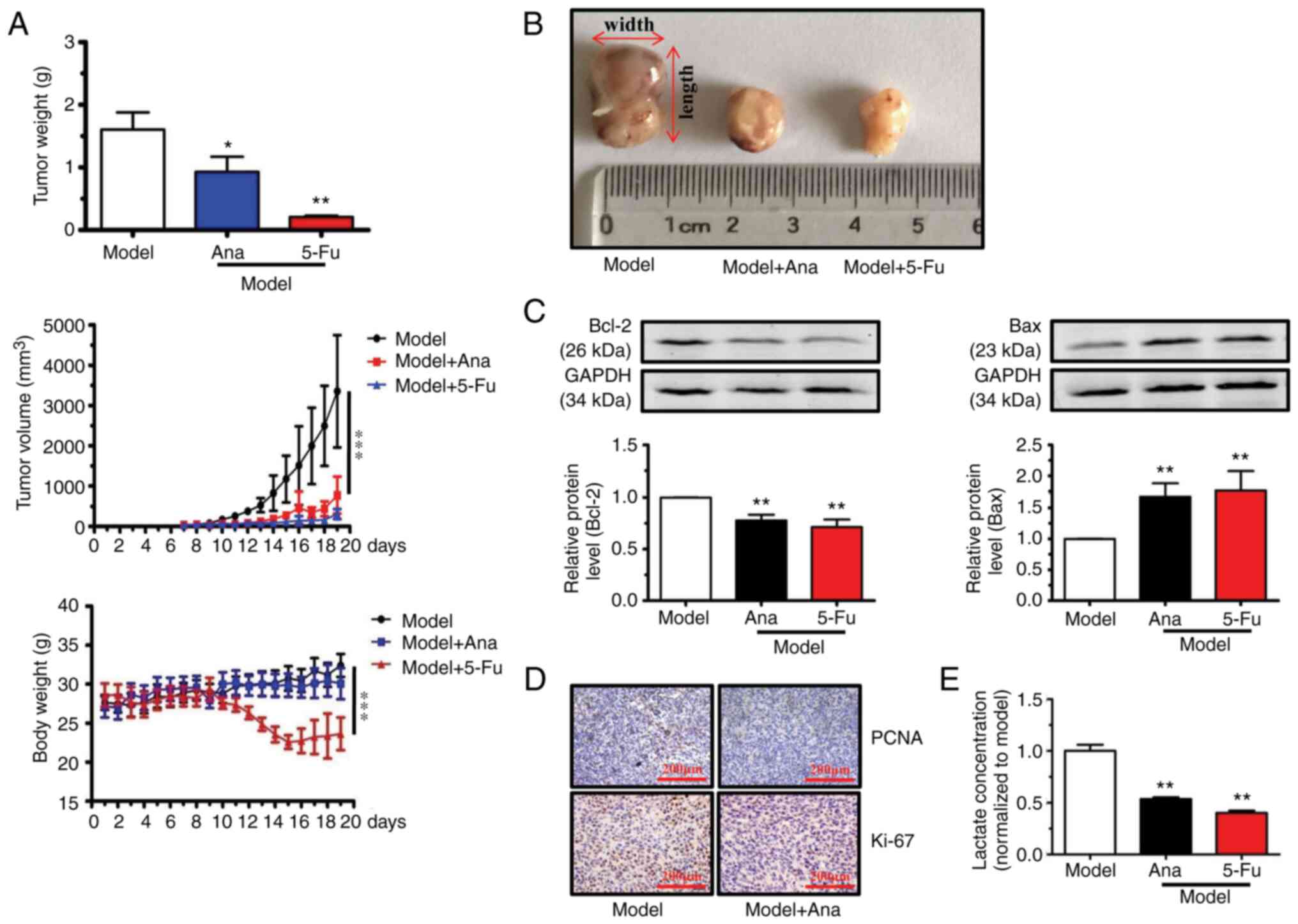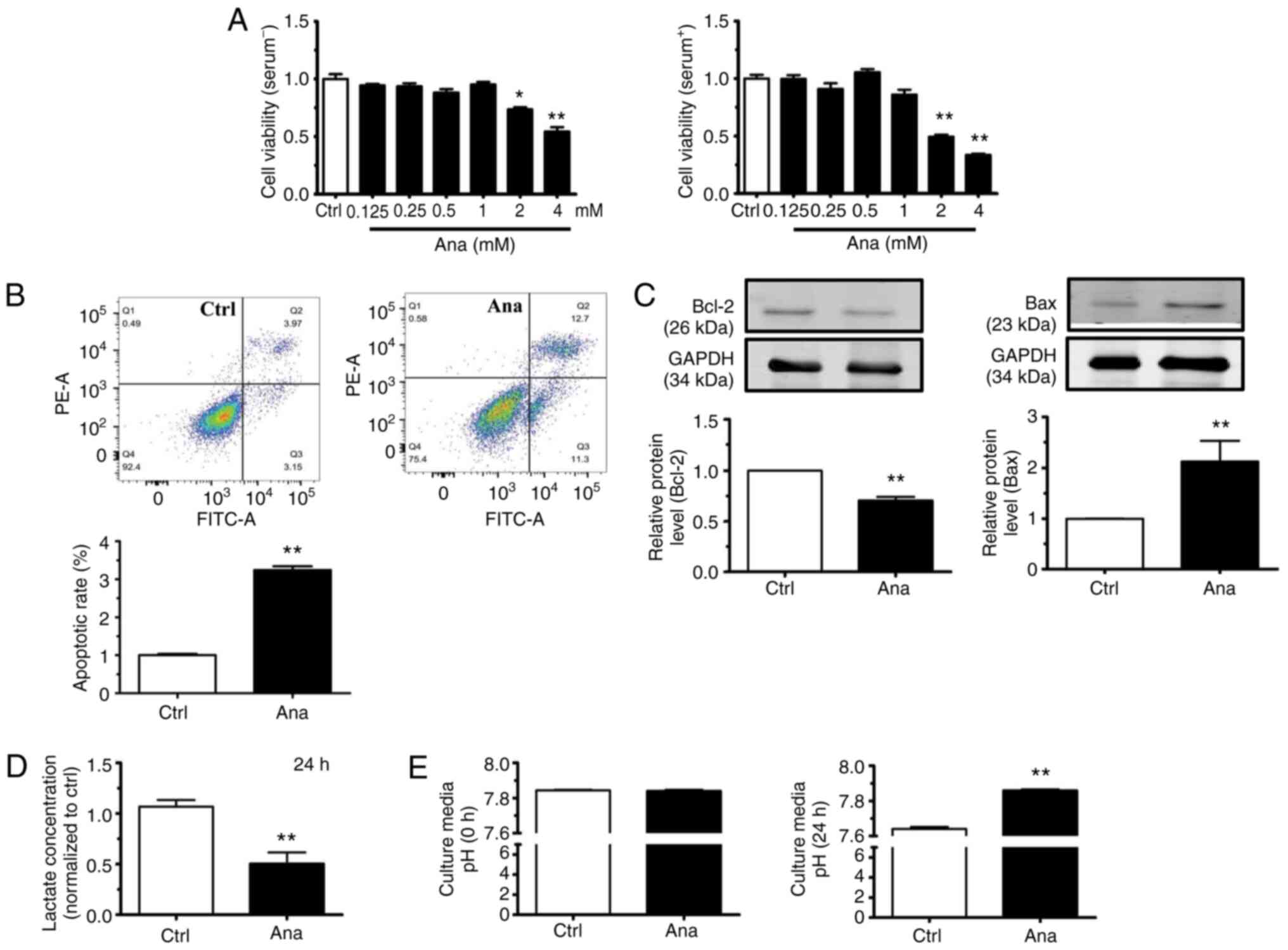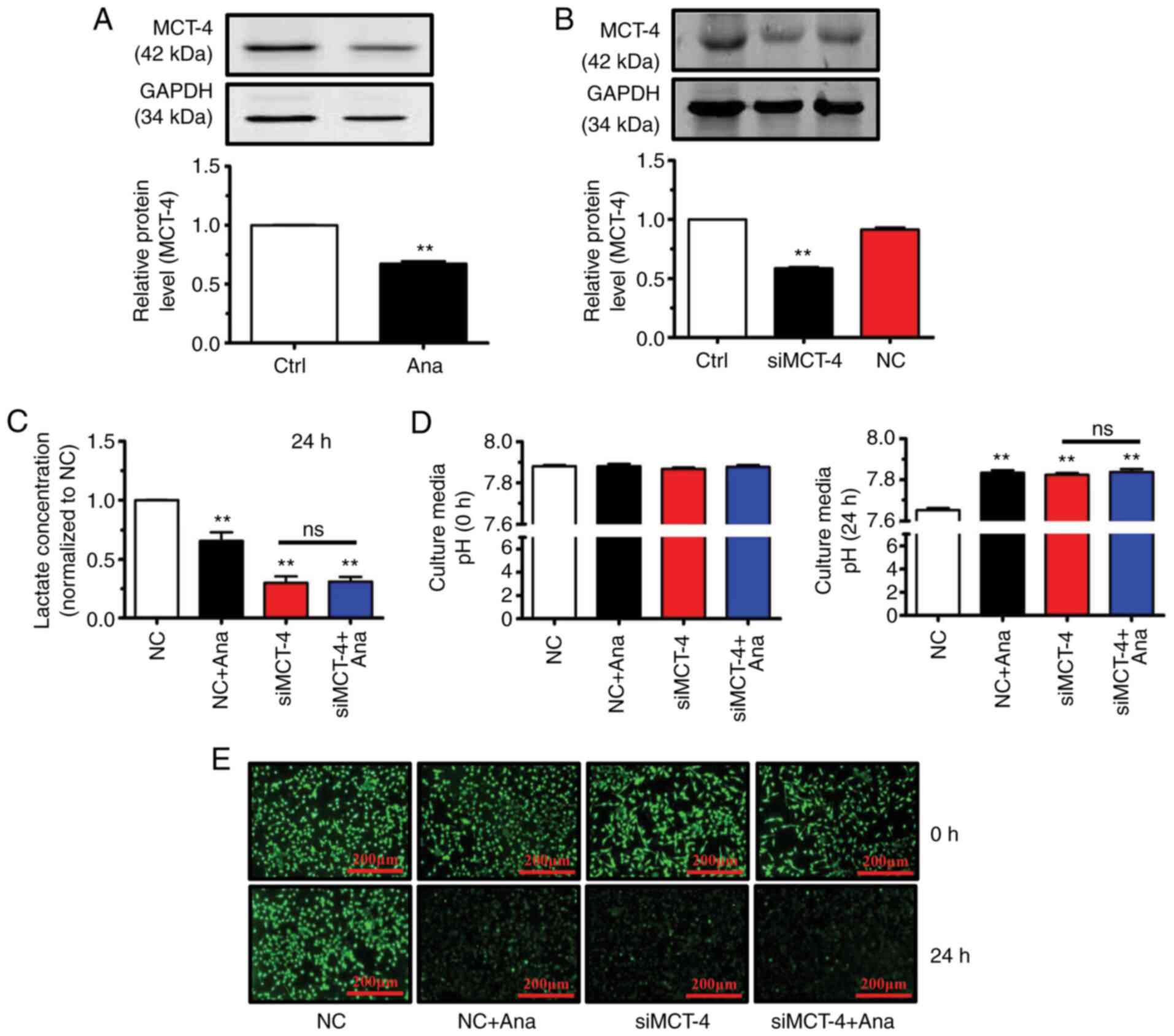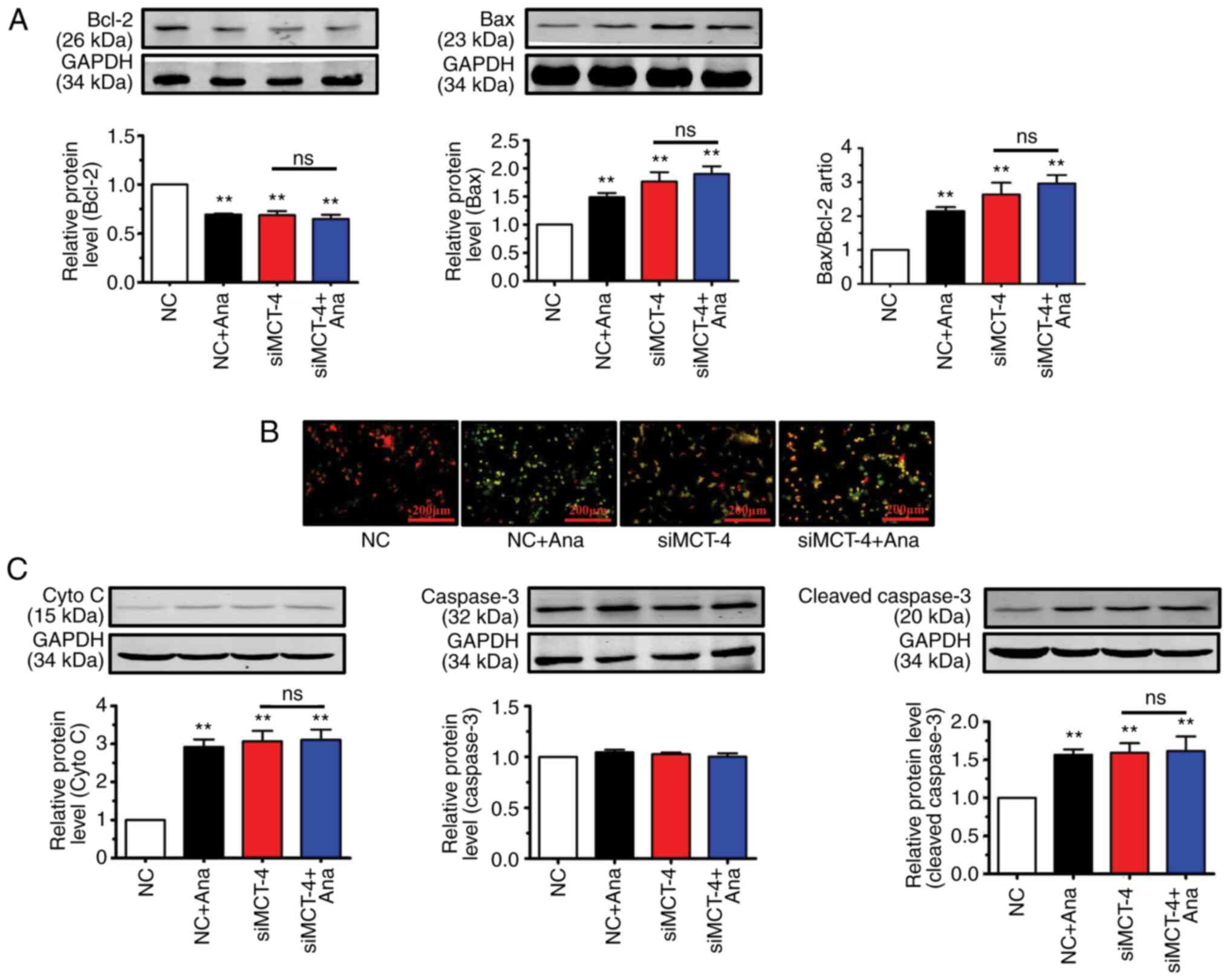|
1
|
Bray F, Ferlay J, Soerjomataram I, Siegel
RL, Torre LA and Jemal A: Global cancer statistics 2018: GLOBOCAN
estimates of incidence and mortality worldwide for 36 cancers in
185 countries. CA Cancer J Clin. 68:394–424. 2018.PubMed/NCBI View Article : Google Scholar
|
|
2
|
Ye M, Han Y, Tang J, Piao Y, Liu X, Zhou
Z, Gao J, Rao J and Shen Y: A tumor specific cascade amplification
drug release nanoparticle for overcoming multidrug resistance in
cancers. Adv Mater. 29(1702342)2017.PubMed/NCBI View Article : Google Scholar
|
|
3
|
Park JH, Pyun WY and Park HW: Cancer
metabolism: Phenotype, signaling and therapeutic targets. Cell.
9(2308)2020.PubMed/NCBI View Article : Google Scholar
|
|
4
|
Urbanska K and Orzechowski A:
Unappreciated role of LDHA and LDHB to control apoptosis and
autophagy in tumor cells. Int J Mol Sci. 20(2085)2019.PubMed/NCBI View Article : Google Scholar
|
|
5
|
Tannock IF and Rotin D: Acid pH in tumors
and its potential for therapeutic exploitation. Cancer Res.
49:4373–4384. 1989.PubMed/NCBI
|
|
6
|
Zhang T, Suo C, Zhaeng C and Zhang H:
Hypoxia and metabolism in metastasis. Adv Exp Med Biol. 1136:87–95.
2019.PubMed/NCBI View Article : Google Scholar
|
|
7
|
Zheng T, Jaattela M and Liu B: pH gradient
reversal fuels cancer progression. Int J Biochem Cell Biol.
125(105796)2020.PubMed/NCBI View Article : Google Scholar
|
|
8
|
Magistretti PJ and Allaman I: Lactate in
the brain: From metabolic end-product to signaling molecule. Nat
Rev Neurosci. 19:235–249. 2018.PubMed/NCBI View Article : Google Scholar
|
|
9
|
Brooks GA: Lactate as a fulcrum of
metabolism. Redox Biol. 35(101454)2020.PubMed/NCBI View Article : Google Scholar
|
|
10
|
Becker HM: Carbonic anhydrase Ⅸ and acid
transport in cancer. Br J Cancer. 122:157–167. 2020.PubMed/NCBI View Article : Google Scholar
|
|
11
|
Quade BN, Parker MD and Occhipinti R: The
therapeutic importance of acid-base balance. Biochem Pharmacol.
183(114278)2021.PubMed/NCBI View Article : Google Scholar
|
|
12
|
Abbott CA, Baker E, Sutherland GR and
McCaughan GW: Genomic organization, exact localization, and tissue
expression of the human CD26 (dipeptidyl peptidase IV) gene.
Immunogenetics. 40:331–338. 1994.PubMed/NCBI View Article : Google Scholar
|
|
13
|
Ropa J and Broxmeyer HE: An expanded role
for Dipeptidyl peptidase 4 in cell regulation. Curr Opin Hematol.
27:215–224. 2020.PubMed/NCBI View Article : Google Scholar
|
|
14
|
Yang F, Takagaki Y, Yoshitomi Y, Ikeda T,
Li J, Kitada M, Kumagai A, Kawakita E, Shi S, Kanasaki K and Koya
D: Inhibition of dipeptidyl peptidase-4 accelerates
epithelial-mesenchymal transition and breast cancer metastasis via
the CXCL12/CXCR4/mTOR Axis. Cancer Res. 79:735–746. 2019.PubMed/NCBI View Article : Google Scholar
|
|
15
|
Li R, Zeng X, Yang M, Feng J, Xu X, Bao L,
Ye T, Wang X, Xue B and Huang Y: Antidiabetic DPP-4 inhibitors
reprogram tumor microenvironment that facilitates murine breast
cancer metastasis through interaction with cancer cells via a
ROS-NF-B-NLRP3 Axis. Front Oncol. 11(728047)2021.PubMed/NCBI View Article : Google Scholar
|
|
16
|
Pinto LC, Rados DV, Barkan SS, Leitão CB
and Gross JL: Dipeptidyl peptidase-4 inhibitors, pancreatic cancer
and acute pancreatitis: A meta-analysis with trial sequential
analysis. Sci Rep. 8(782)2018.PubMed/NCBI View Article : Google Scholar
|
|
17
|
Sun ZG, Li ZN and Zhu HL: The research
progress of DPP-4 inhibitors. Mini Rev Med Chem. 20:1709–1718.
2020.PubMed/NCBI View Article : Google Scholar
|
|
18
|
Zhang C, Ma Q, Shi Y, Li X, Wang M, Wang
J, Ge J, Chen Z, Wang Z and Jiang H: A novel
5-fluorouracil-resistant human esophageal squamous cell carcinoma
cell line Eca-109/5-FU with significant drug resistance-related
characteristics. Oncol Rep. 37:2942–2954. 2017.PubMed/NCBI View Article : Google Scholar
|
|
19
|
Canadian Council on Animal Care (CCAC):
CCAC revised guidance on euthanasia using carbon dioxide. CCAC,
Ottawa, ON, 2020. https://ccac.ca/en/news-and-events/news/2020headlines/ccac-revised-guidance-on-euthanasia-using-carbon-dioxide.html.
Accessed July 24, 2020.
|
|
20
|
Golda-VanEeckhoutte RL, Roof LT, Needoba
JA and Peterson TD: Determination of intracellular pH in
phytoplankton using the fluorescent probe, SNARF, with detection by
fluorescence spectroscopy. J Microbiol Methods. 152:109–118.
2018.PubMed/NCBI View Article : Google Scholar
|
|
21
|
Trivedi B and Danforth WH: Effect of pH on
the kinetics of frog muscle phosphofructokinase. J Biol Chem.
241:4110–4112. 1966.PubMed/NCBI
|
|
22
|
Lai SW, Lin HJ, Liu YS, Yang LY and Lu DY:
Monocarboxylate transporter 4 regulates glioblastoma motility and
monocyte binding ability. Cancer (Basel). 12(380)2020.PubMed/NCBI View Article : Google Scholar
|
|
23
|
Liu Y, Guo JZ, Liu Y, Wang K, Ding W, Wang
H, Liu X, Zhou S, Lu XC, Yang HB, et al: Nuclear lactate
dehydrogenase A senses ROS to produce α-hydroxybutyrate for
HPV-induced cervical tumor growth. Nat Commun.
9(4429)2018.PubMed/NCBI View Article : Google Scholar
|
|
24
|
Zhu Y, Han XQ, Sun XJ, Yang R, Ma WQ and
Liu NF: Lactate accelerates vascular calcification through NR4A1
regulated mitochondrial fission and BNIP-3 related mitophagy.
Apoptosis. 25:321–340. 2020.PubMed/NCBI View Article : Google Scholar
|
|
25
|
Roger C, Erkes DA, Nardone A, Aplin AE,
Fernandes-Alnemri T and Alnemri ES: Gasdermin pores permeabilize
mitochondrial to augment caspase-3 activation during apoptosis and
inflammasome activation. Nat Commun. 10(1689)2019.PubMed/NCBI View Article : Google Scholar
|
|
26
|
Baltazar F, Pinheiro C, Morais-Santos F,
Azevedo-Silva J, Queirós O, Preto A and Casal M: Monocarboxylate
transporters as targets and mediators in cancer therapy response.
Histol Histopathol. 29:1511–1524. 2014.PubMed/NCBI View Article : Google Scholar
|
|
27
|
Nath M, Bhattacharjee K and Choudhury Y:
Vilfagliptin, a dipeptidyl peptides-4 inhibitor, reduces betel-nut
induced carcinogenesis in femal mice. Life Sci.
266(118870)2021.PubMed/NCBI View Article : Google Scholar
|
|
28
|
Enz N, Vliegen G, De Meester I and
Jungraithmayr W: CD26/DPP4-a potential biomarker and target for
cancer therapy. Pharmacol Ther. 198:135–159. 2019.PubMed/NCBI View Article : Google Scholar
|
|
29
|
Ali A, Fuentes A, Skelton WP IV, Wang Y,
McGorray S, Shah C, Bishnoi R, Dang LH and Dang NH: A multi-center
retrospective analysis of the effect of DPP4 inhibitors on
progression-free survival in advanced airway and colorectal
cancers. Mol Clin Oncol. 10:118–124. 2019.PubMed/NCBI View Article : Google Scholar
|
|
30
|
De Chiara L, Páez de la Cadena M,
Rodríguez-Berrocal J, Alvarez-Pardiñas MC, Pardiñas-Añón MC,
Varela-Calviño R and Cordero OJ: CD26-related serum biomarkers:
sCD26 protein, DPP4 activity, and anti-CD26 isotype levels in a
colorectal cancer-screening context. Dis Markers.
2020(4347936)2020.PubMed/NCBI View Article : Google Scholar
|
|
31
|
Shah C, Hong YR, Bishnoi R, Ali A, Skelton
WP IV, Dang LH, Huo J and Dang NH: Impact of DPP4 Inhibitors in
survival of patients with prostate, pancreas, and breast cancer.
Front Oncol. 10(405)2020.PubMed/NCBI View Article : Google Scholar
|
|
32
|
Nishina S, Yamauchi A, Kawaguchi T, Kaku
K, Goto M, Sasaki K, Hara Y, Tomiyama Y, Kuribayashi F, Torimura T
and Hino K: Dipeptidyl peptidase 4 inhibitors reduce hepatocellular
carcinoma by activating lymphocyte chemotaxis in mice. Cell Mol
Gastroenterol Hepatol. 7:115–134. 2018.PubMed/NCBI View Article : Google Scholar
|
|
33
|
Nakaya K, Kubota N, Takamoto I, Kubota T,
Katsuyama H, Sato H, Tokuyama K, Hashimoto S, Goto M, Jomori T, et
al: Dipeptidyl peptidase-4 inhibitor anagliptin ameliorates
diabetes in mice with haploinsufficiency of glucokinase on a
high-fat diet. Metabolism. 62:939–951. 2013.PubMed/NCBI View Article : Google Scholar
|
|
34
|
Toft NJ, Axelsen TV, Pedersen HL, Mele M,
Burton M, Balling E, Johansen T, Thomassen M, Christiansen PM and
Boedtkjer E: Acid-base transporters and pH dynamics in human breast
carcinomas predict proliferative activity, metastasis, and
survival. Elife. 10(e68447)2021.PubMed/NCBI View Article : Google Scholar
|
|
35
|
White KA, Grillo-Hill BK and Barber DL:
Cancer cell behaviors mediated by dysregulated pH dynamics at a
glance. J Cell Sci. 130:663–669. 2017.PubMed/NCBI View Article : Google Scholar
|
|
36
|
Berger G and Femdt SM: The metabolism of
cancer cells during metastasis. Nat Rev Cancer. 21:162–180.
2021.PubMed/NCBI View Article : Google Scholar
|
|
37
|
Liu Y, Zhu L, Dong P, Liang R, Mao Y, Yang
X, Zhang Y and Luo X: Acid tolerance response of listeria
monocytogenes in various external pHs with different concentrations
of lactic acid. Foodborne Pathog Dis. 17:253–261. 2020.PubMed/NCBI View Article : Google Scholar
|
|
38
|
Todenhofer T, Seiler R, Stewart C,
Moskalev I, Gao J, Ladhar S, Kamjabi A, Al Nakouzi N, Hayashi T,
Choi S, et al: Selective inhibition of the lactate transporter MCT4
reduces growth of invasive bladder cancer. Mol Cancer Ther.
17:2746–2755. 2018.PubMed/NCBI View Article : Google Scholar
|
|
39
|
Pinheiro C, Longatto-Filho A, Scapulatempo
C, Ferreira L, Martins S, Pellerin L, Rodrigues M, Alves VA,
Schmitt F and Baltzzar F: Increased expression of monocarboxylate
transporters 1, 2, and 4 in colorectal carcinomas. Virchows Arch.
452:139–146. 2008.PubMed/NCBI View Article : Google Scholar
|
|
40
|
Choi SYC, Ettinger SL, Lin D, Xue H, Ci X,
Nabavi N, Bell RH, Mo F, Gout PW, Fleshner NE, et al: Targeting
MCT4 to reduce lactic acid secretion and glycolysis for treatment
of neuroendocrine prostate cancer. Cancer Med. 7:3385–3392.
2018.PubMed/NCBI View Article : Google Scholar
|
|
41
|
Huber V, Camisaschi C, Berzi A, Ferro S,
Lugini L, Triulzi T, Tuccitto A, Tagliabue E, Castelli C and
Rivoltini L: Cancer acidity: An ultimate frontier of tumor immune
escape and a novel target of immunomodulation. Semin Cancer Biol.
43:74–89. 2017.PubMed/NCBI View Article : Google Scholar
|
|
42
|
Birkeland ES, Koch LM and Dechant R:
Another consequence of the warburg effect? Metabolic regulation of
Na+/H+ exchangers may link aerobic glycolysis
to cell growth. Front Oncol. 10(1561)2020.PubMed/NCBI View Article : Google Scholar
|
|
43
|
Rolver MG, Elingaard-Larsen LO, Andersen
AP, Counillon L and Pedersen SF: Pyrazine ring base
Na+/H+ exchanger (NHE) inhibitors potently
inhibit cancer cell growth in 3D culture, independent of NHE1. Sci
Rep. 10(5800)2020.PubMed/NCBI View Article : Google Scholar
|


















